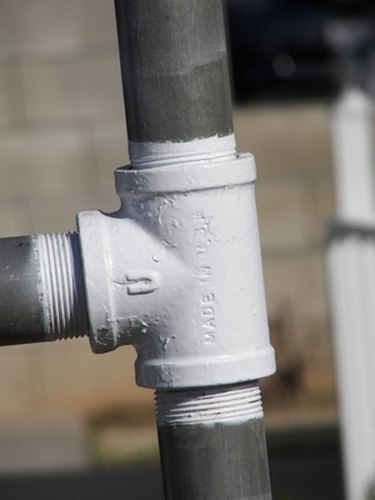
PTFE stands for "polytetrafluoroethylene" and is a Teflon plastic polymer. It is commonly made in tape form and used by plumbers to lubricate and seal threaded pipe fittings. It has a number of unique properties that make it widely used for many different applications.
Low Friction
Video of the Day

Fluorinated plastic polymers known as Teflon include PTFE. PTFE has a very low coefficient of friction--it is slippery. This makes it an ideal treatment for plumbers to wrap on pipe threads to make pipe fittings screw together more easily. It conforms to objects and acts as a gasket, improving the fit and seal of conjoined fittings.
Video of the Day
Heat Resistant

PTFE has an extraordinarily high melting point for a plastic, 327 degrees Celsius or 621 degrees F. It is rated for use at temperatures up to 260 degrees Celsius, 500 degrees F. For most applications, PTFE will not degrade from exposure to heat.
Electrical Insulator
PTFE an excellent electrical insulator. In combination with its high heat resistance, this makes it useful in electrical applications where insulation and heat resistance are required. PTFE is manufactured as heat-shrink tubing that can be placed over wires and then heat-shrunk for a water resistant and electrically insulating fit.
Flexible and Durable
PTFE tape can be stretched to fit snugly around fittings or wires. It can be elongated 200 to 400 percent without tearing. PTFE is water resistant. Exposure to light has little effect on degrading PTFE, making it very durable in outdoor applications. PTFE is not affected by ultraviolet, visible or infrared light.
Chemically Inert
PTFE has a high resistance to both acids and bases. There is no known solvent for PTFE. The polymers in PTFE are uniformly sheathed with fluorine atoms, making PTFE inert to virtually all chemicals. Only under extraordinary circumstances will PTFE degrade. PTFE will react with metallic sodium, interhalogen compounds and ionized oxygen. It will also degrade under extreme electron bombardment. These reactive situations are not normally encountered outside of special laboratory conditions.